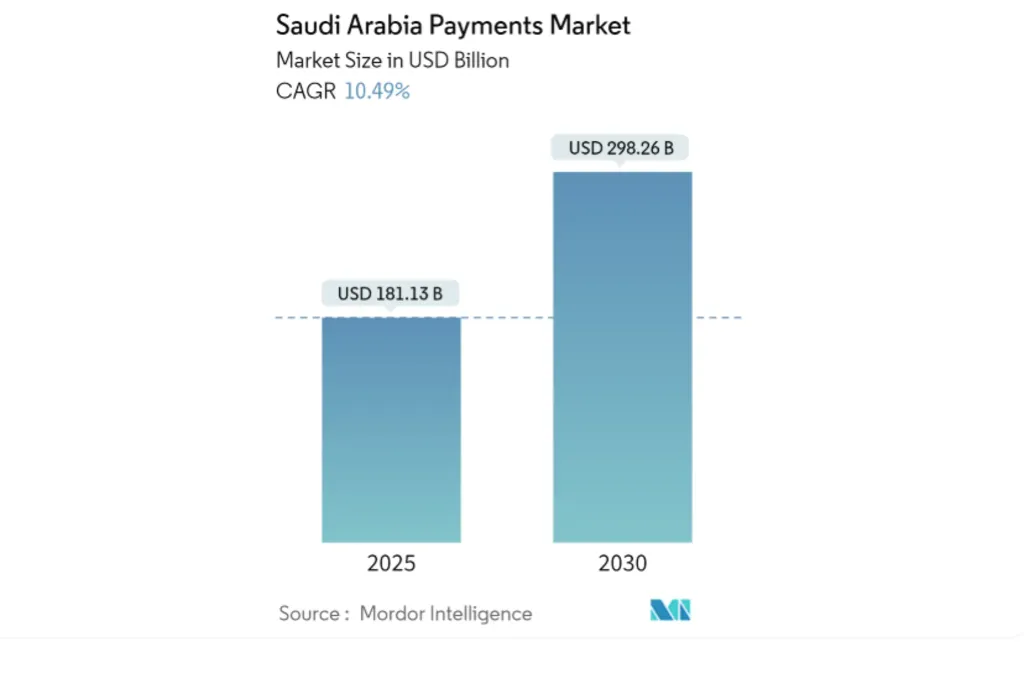Saudi Fintech Partnerships Lay Groundwork for Cross-Border M&A
Saudi Arabia’s fintech sector is evolving not just through product innovation, but through strategic partnerships that signal global readiness. With a 79% cashless transaction rate achieved in 2024, the Kingdom has already surpassed its 2025 target, positioning itself as a mature digital economy. These Saudi Fintech Partnerships are more than technical integrations; they’re strategic moves that enhance the country’s attractiveness for cross-border mergers and acquisitions (M&A).
$181B Payments Market Signals Scale and M&A Potential
Saudi Arabia’s payments market reached USD 181.13 billion in 2025 and is projected to grow to USD 298.26 billion by 2030, driven by a 10.49% compound annual growth rate. This scale is a key factor for global investors evaluating M&A opportunities. Saudi Fintech Partnerships are enabling platforms to scale across sectors—from e-commerce to pilgrim wallets—making them viable targets for acquisition or joint ventures.
Google Pay Integration Demonstrates Interoperability
The integration of Google Pay into the national mada system reflects Saudi Arabia’s commitment to global interoperability. Users can now manage mada and digital credit cards through Google Wallet, aligning domestic infrastructure with international standards. This move strengthens the credibility of Saudi fintech firms in the eyes of foreign acquirers, who prioritize seamless integration in post-M&A environments.
Alipay+ Partnership Expands Access to Asian Markets
SAMA’s collaboration with Ant International to launch cross-border QR code payments between mada and Alipay+ by 2026 is a strategic bridge to Asian markets. By enabling Saudi SMEs to accept payments from Alipay+’s global network, the partnership enhances commercial connectivity and positions local fintechs for regional expansion. These Saudi Fintech Partnerships offer acquirers built-in access to both domestic and international customer bases.
Thunes Enables Real-Time Cross-Border Transfers
Thunes’ launch of real-time transfers into Saudi Arabia via its Direct Global Network adds another layer of operational maturity. Instant payments to Saudi bank accounts and wallets in SAR reduce friction for international transactions. This infrastructure is critical for M&A due diligence, as it demonstrates scalability, compliance, and readiness for global integration.
Regulatory Sandbox Graduates 25 Licensed Fintechs
SAMA’s Regulatory Sandbox has admitted over 70 fintechs, with more than 25 graduating into fully licensed providers. This structured environment allows companies to test and refine their models under regulatory supervision. For potential acquirers, this signals a stable and transparent licensing pathway—reducing risk and accelerating time-to-market post-acquisition.
Vision 2030 Aligns Fintech Growth with National Strategy
Saudi Fintech Partnerships are deeply aligned with Vision 2030’s Financial Sector Development Program, which aims to achieve 70% non-cash transactions by 2030 and attract 150 million visitors. With the 79% milestone already reached, fintech firms are now focused on inclusion, tourism support, and job creation. These strategic goals make Saudi fintechs attractive M&A targets for global firms seeking long-term regional presence.
Strategic Partnerships as M&A Signals
The integration of Google Pay, Alipay+, and Thunes into Saudi Arabia’s financial ecosystem is more than operational—it’s a strategic signal to the global market. These Saudi Fintech Partnerships demonstrate regulatory clarity, infrastructure maturity, and consumer adoption at scale. For international investors, they represent a low-friction entry point into a high-growth market, making Saudi fintech firms prime candidates for cross-border M&A.
Also Read: Cross-Border M&A in Saudi Arabia: Trends and Opportunities








